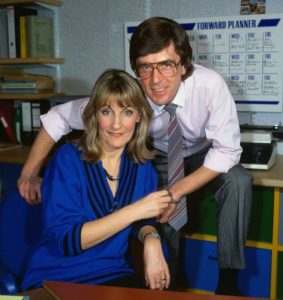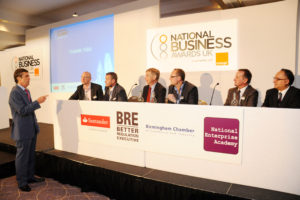I was really lucky to have worked with Lynn Faulds-Wood and John Stapleton when the dynamic duo presented Watchdog in the early ‘90s.
 In those days, the production office was sandwiched between Kilroy (floor below) and That’s Life (floor above) at BBC Lime Grove Studios in Hammersmith (now sadly long gone). However, my memories of working with Lynn and John and meeting them years after we’d all left the show have stayed with me ever since.
In those days, the production office was sandwiched between Kilroy (floor below) and That’s Life (floor above) at BBC Lime Grove Studios in Hammersmith (now sadly long gone). However, my memories of working with Lynn and John and meeting them years after we’d all left the show have stayed with me ever since.
I remember Lynn and John saying to me that they thought I wrote really well for TV and they never changed a word of the scripts I would write for them. That was high praise given it was my first AP job in telly.
I had come across from BBC Network Radio in Broadcasting House where we were fond of saying ‘the pictures are better on radio’. I guess this was a back handed compliment as to why words matter so much in broadcasting.
Such skills came in useful when I subsequently graduated to making short documentaries and moved into digital online and animation, and later in my career turning data privacy training into something that could entertain, inform and engage. In many respects, that sums up why Watchdog was so successful at its peak – it could entertain, inform and engage in the spirt of public service broadcasting that is so absent from much of the content broadcast today.
Years later after Watchdog, I found myself director of communications for the Imperial Cancer Research Fund. Lynn contacted me and invited me for tea at their lovely house in St Margaret’s near Richmond, Surrey. It was a sunny afternoon and I remember Nick just coming back from school dressed in his school uniform with one of his friends for a play date. I also remember John and Lynn showing me photographs of a recent holiday they took to India and how much they enjoyed the experience.
Lynn wanted my advice about launching a new charity that tackled the ‘taboo’ subject of bowel cancer, given that she had survived such an experience. We had a long conversation about cultural sensitivities and whether showing the bum of a cartoon character on a poster could potentially cause offence. Of course, all that sounds a bit ridiculous now considering the Covid-19 pandemic and the huge efforts needed to grab attention and influence behaviour and using every trick in the book to do so.
Back in the day, bowel cancer was something of a taboo topic. But Lynn made it her mission to make people feel much more comfortable talking about their bodily functions so they could seek help early and prevent the disease from taking hold before it was too late.
Lynn got to launch her bowel cancer charity and went on to develop the first evidence-based guide to symptoms of bowel cancer, that was adopted by the Department of Health in 2000.
Lynn wasn’t off the telly for long and in 2003 was back on our screens as consumer champion for GMTV’s breakfast show.
 In 2010, I was invited to be the keynote speaker at the National Business Awards in Birmingham and was to be introduced by John. The tables had turned! I couldn’t resist saying that it had been my privilege to have worked with John and Lynn all those years earlier where I would be the one writing scripts for them.
In 2010, I was invited to be the keynote speaker at the National Business Awards in Birmingham and was to be introduced by John. The tables had turned! I couldn’t resist saying that it had been my privilege to have worked with John and Lynn all those years earlier where I would be the one writing scripts for them.
At the end of her life, Lynn contracted antiphospholipid syndrome, an autoimmune disease that includes making the blood viscous. Lynn suffered a stroke as a side-effect of taking blood thinners to alleviate this condition and died on 24 April 2020, aged 72 years-old.
The spirit of campaigning journalism is in great shape today, in large part due to the hard work of Lynn, who cultivated this in everyone who worked with her almost a quarter of a century ago.
This article first appeared on the BBC Alumni website














Recent Comments